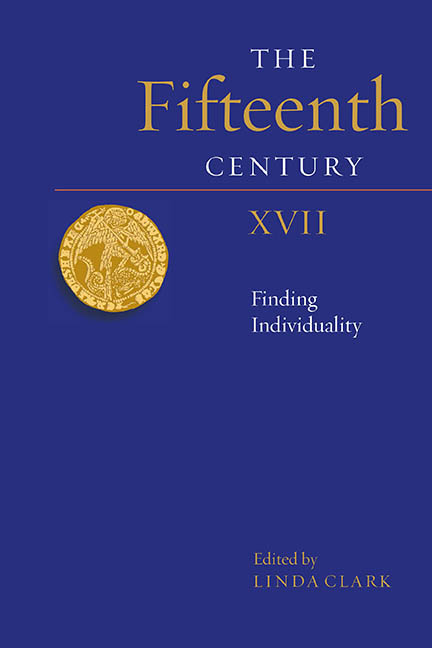Book contents
- Frontmatter
- Contents
- Contributors
- Preface
- Abbreviations
- Royal Wills, 1376–1475
- Propaganda, Piety and Politics in the Fifteenth Century: Henry V’s Vernacular War Letters to the City of London, 1417–21
- ‘To Be of Oon Demeanyng and Unite for the Wele of Your Self and of the Contre There’: Yorkist Plans for the Lordship of Ireland, the Last Phase
- A Mirror for a Princess: Antoine de la Sale and the Political Psyche of Margaret of Anjou
- Margaret of Anjou and the Language of Praise and Censure
- On ‘Peyne of their Lyfes … they Shuld no Verdit gif, but if they Wold Endite the Seid William Tresham of his Owen Deth’: the Murder of Lawyers in Fifteenth-Century England
- ‘Stond Horeson and Yelde thy Knyff’: Urban Politics, Language and Litigation in Late Medieval Canterbury
- ‘In to the Sterre Chambre’: Female Plaintiffs Before the King’s Council in the Reign of Henry VII
- Index
- Contents of Previous Volumes
Margaret of Anjou and the Language of Praise and Censure
Published online by Cambridge University Press: 19 August 2020
- Frontmatter
- Contents
- Contributors
- Preface
- Abbreviations
- Royal Wills, 1376–1475
- Propaganda, Piety and Politics in the Fifteenth Century: Henry V’s Vernacular War Letters to the City of London, 1417–21
- ‘To Be of Oon Demeanyng and Unite for the Wele of Your Self and of the Contre There’: Yorkist Plans for the Lordship of Ireland, the Last Phase
- A Mirror for a Princess: Antoine de la Sale and the Political Psyche of Margaret of Anjou
- Margaret of Anjou and the Language of Praise and Censure
- On ‘Peyne of their Lyfes … they Shuld no Verdit gif, but if they Wold Endite the Seid William Tresham of his Owen Deth’: the Murder of Lawyers in Fifteenth-Century England
- ‘Stond Horeson and Yelde thy Knyff’: Urban Politics, Language and Litigation in Late Medieval Canterbury
- ‘In to the Sterre Chambre’: Female Plaintiffs Before the King’s Council in the Reign of Henry VII
- Index
- Contents of Previous Volumes
Summary
Margaret of Anjou arrived in England in April 1445. Her marriage to Henry VI formed part of negotiations for a new peace with France, but eight years later the loss of England's last French territory and the mental collapse of Henry VI precipitated a political crisis which brought Margaret into the forefront as the effective head of a Lancastrian court party in opposition to Richard, duke of York. Margaret's claim to authority in England died with her husband and son in 1471; she was confined, forced to renounce all lands and titles on both sides of the Channel and died a pensioner of Louis XI in 1482. ‘An object lesson in how not to behave as a queen consort.’ So runs a typical summary of Margaret's career. Yet it is by no means clear that there was an established model of how a medieval English queen consort was supposed to behave. If we listen again to contemporary voices concerning Margaret, we find that there was anything but consensus: contemporary criticism of her queenship arose from a lack of clear definition, rather than any agreed-upon account of her transgressions.
The modern historiography of the queen, by contrast, is couched in terms of acceptable versus transgressive behaviour. Certain things, we are told, were expected of queens, indeed of women in general. Thus for Helen Maurer, the operative word to explain Margaret's political role is ‘necessity’: the queen was driven by circumstance to contravene the boundaries of accepted queenship, even as she tried to adhere to them. Other studies of Margaret have focused on her infertility, infidelity and inappropriate political intervention. These topics are discussed below: for now, the point to note is that all of these are seen in terms of a deficit in queenly attributes – attributes which, it is presumed, were universally recognised. Joanna Laynesmith's survey of the Last Medieval Queens introduces a comprehensive approach to the structures around queenship, and draws attention to the disparities between ‘ideology’ and experience. I would like to go a step further, and suggest that the ideology itself was incoherent: contemporaries had not agreed on a set place for the queen within the English polity.
- Type
- Chapter
- Information
- The Fifteenth Century XVIIFinding Individuality, pp. 81 - 98Publisher: Boydell & BrewerPrint publication year: 2020



